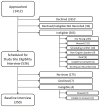Childhood Adversities Associated with Poor Adult Mental Health Outcomes in Older Homeless Adults: Results From the HOPE HOME Study
- PMID: 27544890
- PMCID: PMC5253307
- DOI: 10.1016/j.jagp.2016.07.019
Childhood Adversities Associated with Poor Adult Mental Health Outcomes in Older Homeless Adults: Results From the HOPE HOME Study
Abstract
Objective: To examine whether childhood adversity is associated with depressive symptoms, suicide attempts, or psychiatric hospitalization.
Methods: History of seven childhood adversities (physical neglect, verbal abuse, physical abuse, sexual abuse, parental death, parental incarceration, and child welfare system placement) was gathered through in-person interviews. Multivariate models examined associations between history of childhood adversities and moderate to severe depressive symptoms, lifetime history of suicide attempt, or lifetime history of psychiatric hospitalization. The study enrolled 350 homeless adults, aged 50 and older, in Oakland, California, using population-based sampling methods. Moderate to severe depressive symptoms were measured on a Center for Epidemiologic Studies-Depression Scale (≥22), self-reported lifetime history of suicide attempt, and self-reported lifetime history of psychiatric hospitalization.
Results: Participants with exposure to one childhood adversity had elevated odds of reporting moderate to severe depressive symptoms (adjusted odds ratio [AOR]: 2.0; 95% confidence interval [CI]: 1.1-3.7) and lifetime history of suicide attempt (AOR: 4.6; 95% CI: 1.0-21.6) when compared with those who had none; the odds of these two outcomes increased with exposure to additional childhood adversities. Participants with four or more childhood adversities had higher odds of having a lifetime history of psychiatric hospitalization (AOR: 7.1; 95% CI: 2.8-18.0); no increase with fewer adversities was found.
Conclusion: Childhood adversities are associated with poor mental health outcomes among older homeless adults. Clinicians should collect information about childhood adversities among this high-risk population to inform risk assessment and treatment recommendations.
Keywords: depression; epidemiology; geriatrics; homeless persons; mental health services; suicide.
Copyright © 2017 American Association for Geriatric Psychiatry. Published by Elsevier Inc. All rights reserved.
Conflict of interest statement
M.B. Kushel is a member of the leadership board of Everyone Home, which seeks to end homelessness in Alameda County, CA. No other conflicts of interest were reported.
Figures

Comment in
-
Childhood Adversity's Enduring Impact on Homeless Older Adults.Am J Geriatr Psychiatry. 2017 Feb;25(2):118-119. doi: 10.1016/j.jagp.2016.11.022. Epub 2016 Dec 7. Am J Geriatr Psychiatry. 2017. PMID: 28017517 No abstract available.
Similar articles
-
Association between childhood adversities and long-term suicidality among South Africans from the results of the South African Stress and Health study: a cross-sectional study.BMJ Open. 2014 Jun 11;4(6):e004644. doi: 10.1136/bmjopen-2013-004644. BMJ Open. 2014. PMID: 24919638 Free PMC article.
-
Association between childhood adversities and suicide attempts among alcoholic inpatients in Taiwan.J Stud Alcohol Drugs. 2013 Jul;74(4):559-64. doi: 10.15288/jsad.2013.74.559. J Stud Alcohol Drugs. 2013. PMID: 23739019
-
Physical, Psychological, Social, and Existential Symptoms in Older Homeless-Experienced Adults: An Observational Study of the Hope Home Cohort.J Gen Intern Med. 2018 May;33(5):635-643. doi: 10.1007/s11606-017-4229-1. Epub 2017 Nov 28. J Gen Intern Med. 2018. PMID: 29185174 Free PMC article.
-
Prevention of suicide and attempted suicide in Denmark. Epidemiological studies of suicide and intervention studies in selected risk groups.Dan Med Bull. 2007 Nov;54(4):306-69. Dan Med Bull. 2007. PMID: 18208680 Review.
-
Childhood adversity and subsequent mental health status in adulthood: screening for associations using two linked surveys.Epidemiol Psychiatr Sci. 2016 Apr;25(2):160-70. doi: 10.1017/S2045796015000104. Epub 2015 Feb 25. Epidemiol Psychiatr Sci. 2016. PMID: 25712036 Free PMC article. Review.
Cited by
-
Factors associated with cognitive impairment in a cohort of older homeless adults: Results from the HOPE HOME study.Drug Alcohol Depend. 2017 Sep 1;178:562-570. doi: 10.1016/j.drugalcdep.2017.06.002. Epub 2017 Jul 4. Drug Alcohol Depend. 2017. PMID: 28738314 Free PMC article.
-
Italian Children's Well-Being after Lockdown: Predictors of Psychopathological Symptoms in Times of COVID-19.Int J Environ Res Public Health. 2021 Oct 30;18(21):11429. doi: 10.3390/ijerph182111429. Int J Environ Res Public Health. 2021. PMID: 34769947 Free PMC article.
-
Theoretical frameworks informing the relationship between parental death and suicidal behaviour: A scoping review.Heliyon. 2020 May 12;6(5):e03911. doi: 10.1016/j.heliyon.2020.e03911. eCollection 2020 May. Heliyon. 2020. PMID: 32426539 Free PMC article.
-
Childhood Socioeconomic Status and Adult Subjective Wellbeing: The Role of Hope and Sense of Control.Front Psychol. 2022 Jul 4;13:879132. doi: 10.3389/fpsyg.2022.879132. eCollection 2022. Front Psychol. 2022. PMID: 35859836 Free PMC article.
-
Role of SES on the association between childhood parental death and adulthood suicidal ideation: a mediation analysis using longitudinal dataset in South Korea.BMC Psychiatry. 2021 Mar 23;21(1):162. doi: 10.1186/s12888-021-03146-w. BMC Psychiatry. 2021. PMID: 33757483 Free PMC article.
References
-
- Stergiopoulos V, Herrmann N. Old and homeless: a review and survey of older adults who use shelters in an urban setting. Can J Psychiatry. 2003 Jul;48(6):374–380. - PubMed
MeSH terms
Grants and funding
LinkOut - more resources
Full Text Sources
Other Literature Sources
Medical

